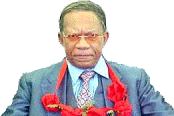Ratsiraka: Madagascar's 'big man'
By the BBC's Johnny Donovan in Antananarivo
Madagascar's incumbent President, Admiral Didier Ratsiraka, has ruled for over 23 years.
He is one
of the last remaining African presidents refusing to hand over power in
the face of a new challenge.
There was a time when Mr Ratsiraka, 65, was known by the people of the
Red Island as Deba, meaning the big man.
It was a fond term of respect for a leader who for years represented the only credible claim to the presidency in Madagascar.
However, Mr Ratsiraka's hegemony is seriously under threat, now that the self-proclaimed president, Mark Ravalomanana, has installed a parallel cabinet in the capital, Antananarivo.
Mr Ratsiraka is no longer there, having moved his base to the north-eastern port city of Tamatave, his political heartland.
Military beginnings
Young Didier Ratsiraka's career, like so many of his political contemporaries, began in the military.
He was one
of a handful of people from the more underdeveloped areas of coastal Madagascar
who gained government sponsorship for studies at the famous naval academy
in Brest, in western France.
Mr Ratsiraka became a brilliant and resourceful officer, who was occasionally described as the best student from amongst his predominantly aristocratic French contemporaries.
On his return
to Madagascar, he was appointed minister of foreign affairs under the
transitional government of General Ramantsoa, at a time when Madagascar's
nationalist movement was rapidly gaining momentum.
But it was in 1972, when Mr Ratsiraka successfully re-negotiated Madagascar's position as a French protectorate, that people began to look at him as the country's next leader.
His initial popularity with his implementation of Malagasy socialism quickly earned him an image as the champion of the masses.
Rich in charisma and charm, he had the advantage of a solid understanding of traditional eloquence so important in negotiations with Madagascar's predominantly rural population.
However, his public appeal could not conceal his political failings.
By the late 1980s Mr Ratsiraka's brand of socialism had made the country desperately poor.
Political downfall
The admiral's regime started to buckle under the weight of a growing opposition voice.
An unforgettable mark of his increasing resistance to change took place in 1991 when 130 people were killed by the presidential security forces.
Mr Ratsiraka had ordered them to open fire on the crowds demanding his resignation, outside the presidential palace.
Later that year he was voted out of office and went into self-imposed exile.
Re-election
In 1994 Mr Ratsiraka was re-elected with promises of increased co-operation with the international community and further liberalisation of the economy.
He is now seeking a fifth term in office under his continuing policies of what he calls ecological humanism.
Whilst President Ratsiraka may not have the popularity that he once boasted, his drive and energy have little diminished over the years.
Many people
in Madagascar are wondering whether Mr Ratsiraka can afford to turn a
blind eye to the wind of change that is so vividly sweeping Madagascar
today.
